The_Theme_of_Jane_Eyre简爱赏析
- 格式:doc
- 大小:50.50 KB
- 文档页数:7
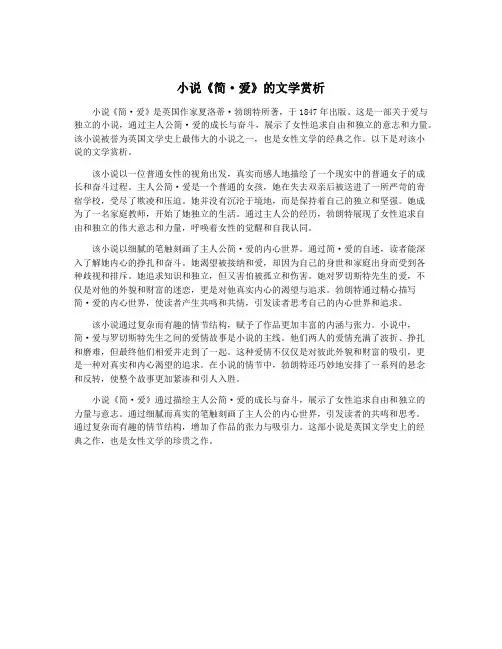
小说《简·爱》的文学赏析小说《简·爱》是英国作家夏洛蒂·勃朗特所著,于1847年出版。
这是一部关于爱与独立的小说,通过主人公简·爱的成长与奋斗,展示了女性追求自由和独立的意志和力量。
该小说被誉为英国文学史上最伟大的小说之一,也是女性文学的经典之作。
以下是对该小说的文学赏析。
该小说以一位普通女性的视角出发,真实而感人地描绘了一个现实中的普通女子的成长和奋斗过程。
主人公简·爱是一个普通的女孩,她在失去双亲后被送进了一所严苛的寄宿学校,受尽了欺凌和压迫。
她并没有沉沦于境地,而是保持着自己的独立和坚强。
她成为了一名家庭教师,开始了她独立的生活。
通过主人公的经历,勃朗特展现了女性追求自由和独立的伟大意志和力量,呼唤着女性的觉醒和自我认同。
该小说以细腻的笔触刻画了主人公简·爱的内心世界。
通过简·爱的自述,读者能深入了解她内心的挣扎和奋斗。
她渴望被接纳和爱,却因为自己的身世和家庭出身而受到各种歧视和排斥。
她追求知识和独立,但又害怕被孤立和伤害。
她对罗切斯特先生的爱,不仅是对他的外貌和财富的迷恋,更是对他真实内心的渴望与追求。
勃朗特通过精心描写简·爱的内心世界,使读者产生共鸣和共情,引发读者思考自己的内心世界和追求。
该小说通过复杂而有趣的情节结构,赋予了作品更加丰富的内涵与张力。
小说中,简·爱与罗切斯特先生之间的爱情故事是小说的主线。
他们两人的爱情充满了波折、挣扎和磨难,但最终他们相爱并走到了一起。
这种爱情不仅仅是对彼此外貌和财富的吸引,更是一种对真实和内心渴望的追求。
在小说的情节中,勃朗特还巧妙地安排了一系列的悬念和反转,使整个故事更加紧凑和引人入胜。
小说《简·爱》通过描绘主人公简·爱的成长与奋斗,展示了女性追求自由和独立的力量与意志。
通过细腻而真实的笔触刻画了主人公的内心世界,引发读者的共鸣和思考。
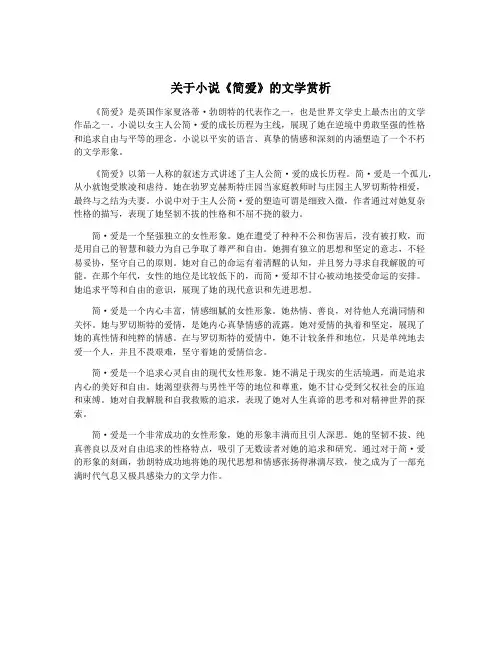
关于小说《简爱》的文学赏析《简爱》是英国作家夏洛蒂·勃朗特的代表作之一,也是世界文学史上最杰出的文学作品之一。
小说以女主人公简·爱的成长历程为主线,展现了她在逆境中勇敢坚强的性格和追求自由与平等的理念。
小说以平实的语言、真挚的情感和深刻的内涵塑造了一个不朽的文学形象。
《简爱》以第一人称的叙述方式讲述了主人公简·爱的成长历程。
简·爱是一个孤儿,从小就饱受欺凌和虐待。
她在勃罗克赫斯特庄园当家庭教师时与庄园主人罗切斯特相爱,最终与之结为夫妻。
小说中对于主人公简·爱的塑造可谓是细致入微,作者通过对她复杂性格的描写,表现了她坚韧不拔的性格和不屈不挠的毅力。
简·爱是一个坚强独立的女性形象。
她在遭受了种种不公和伤害后,没有被打败,而是用自己的智慧和毅力为自己争取了尊严和自由。
她拥有独立的思想和坚定的意志,不轻易妥协,坚守自己的原则。
她对自己的命运有着清醒的认知,并且努力寻求自我解脱的可能。
在那个年代,女性的地位是比较低下的,而简·爱却不甘心被动地接受命运的安排。
她追求平等和自由的意识,展现了她的现代意识和先进思想。
简·爱是一个内心丰富,情感细腻的女性形象。
她热情、善良,对待他人充满同情和关怀。
她与罗切斯特的爱情,是她内心真挚情感的流露。
她对爱情的执着和坚定,展现了她的真性情和纯粹的情感。
在与罗切斯特的爱情中,她不计较条件和地位,只是单纯地去爱一个人,并且不畏艰难,坚守着她的爱情信念。
简·爱是一个追求心灵自由的现代女性形象。
她不满足于现实的生活境遇,而是追求内心的美好和自由。
她渴望获得与男性平等的地位和尊重,她不甘心受到父权社会的压迫和束缚。
她对自我解脱和自我救赎的追求,表现了她对人生真谛的思考和对精神世界的探索。
简·爱是一个非常成功的女性形象,她的形象丰满而且引人深思。
她的坚韧不拔、纯真善良以及对自由追求的性格特点,吸引了无数读者对她的追求和研究。

小说《简·爱》的文学赏析《简·爱》是英国作家夏洛蒂·勃朗特所著的经典小说,也是她最具代表性的作品之一。
小说以女主人公简·爱的成长经历为主线,通过描述她的生活经历、内心感受和价值观转变,展现出勇敢、独立和自由的女性形象,同时也探讨了爱情、社会地位和女性自我价值的问题,具有深刻的思想和情感内涵。
小说通过描写简·爱的人生经历展示了女性的独立精神和坚强意志。
简·爱从小就经历了孤儿院的操劳和苦难,但她并没有被压倒,她有着强烈的求知欲和追求自由的意愿。
在勃洛校园学习期间,简·爱拼尽全力获得知识和成就,她不依赖他人而是依靠自己的努力来改变自己的命运。
她坚信,只有通过学习和工作才能够实现自我价值和自由。
她愿意为自己的独立而放弃依赖和婚姻,这使得她在当时的社会中成为了一个非常少见的女性形象。
小说通过揭示爱情的复杂性以及社会地位的不平等,展现了女性在追求自我实现过程中所面临的困境。
与罗切斯特相遇后,简·爱坠入了爱情的漩涡之中。
她也逐渐意识到,爱情并不是简单的甜蜜和幸福,而是需要付出代价的。
简·爱意识到她和罗切斯特的社会地位和经济条件存在差距,这导致她在婚姻问题上面临着抉择。
她不能容忍在婚姻中失去自我,她拒绝了罗切斯特的求婚,这体现了她对自由和独立的坚持。
通过这一情节,小说深刻地揭示了女性在当时社会中追求爱情和自由之间的矛盾和困境。
小说通过描写简·爱的心灵成长,探讨了人性和宽容的主题。
简·爱在追求自由和独立的过程中,不断地面对自己的内心和与他人的关系。
她学会了宽容和原谅,与她的堂表兄弟斯德·约翰建立了一种纯粹的精神关系。
简·爱通过与约翰的交往,体验到了崇高的精神境界,并最终找到了真正属于她自己的幸福和满足。
这一情节展现了作者对于宽容、信念和自我实现的追求。
《简·爱》是一部描写女性自我追求和人生成长的经典小说。
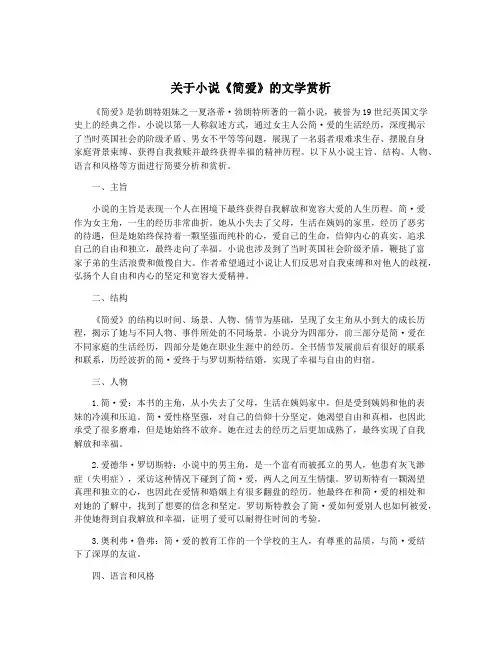
关于小说《简爱》的文学赏析《简爱》是勃朗特姐妹之一夏洛蒂·勃朗特所著的一篇小说,被誉为19世纪英国文学史上的经典之作。
小说以第一人称叙述方式,通过女主人公简·爱的生活经历,深度揭示了当时英国社会的阶级矛盾、男女不平等等问题,展现了一名弱者艰难求生存、摆脱自身家庭背景束缚、获得自我救赎并最终获得幸福的精神历程。
以下从小说主旨、结构、人物、语言和风格等方面进行简要分析和赏析。
一、主旨小说的主旨是表现一个人在困境下最终获得自我解放和宽容大爱的人生历程。
简·爱作为女主角,一生的经历非常曲折。
她从小失去了父母,生活在姨妈的家里,经历了恶劣的待遇,但是她始终保持着一颗坚强而纯朴的心,爱自己的生命,信仰内心的真实,追求自己的自由和独立,最终走向了幸福。
小说也涉及到了当时英国社会阶级矛盾,鞭挞了富家子弟的生活浪费和傲慢自大。
作者希望通过小说让人们反思对自我束缚和对他人的歧视,弘扬个人自由和内心的坚定和宽容大爱精神。
二、结构《简爱》的结构以时间、场景、人物、情节为基础,呈现了女主角从小到大的成长历程,揭示了她与不同人物、事件所处的不同场景。
小说分为四部分,前三部分是简·爱在不同家庭的生活经历,四部分是她在职业生涯中的经历。
全书情节发展前后有很好的联系和联系,历经波折的简·爱终于与罗切斯特结婚,实现了幸福与自由的归宿。
三、人物1.简·爱:本书的主角,从小失去了父母,生活在姨妈家中,但是受到姨妈和他的表妹的冷漠和压迫。
简·爱性格坚强,对自己的信仰十分坚定,她渴望自由和真相,也因此承受了很多磨难,但是她始终不放弃。
她在过去的经历之后更加成熟了,最终实现了自我解放和幸福。
2.爱德华·罗切斯特:小说中的男主角,是一个富有而被孤立的男人,他患有灰飞渺症(失明症),采访这种情况下碰到了简·爱,两人之间互生情愫。
罗切斯特有一颗渴望真理和独立的心,也因此在爱情和婚姻上有很多翻盘的经历。
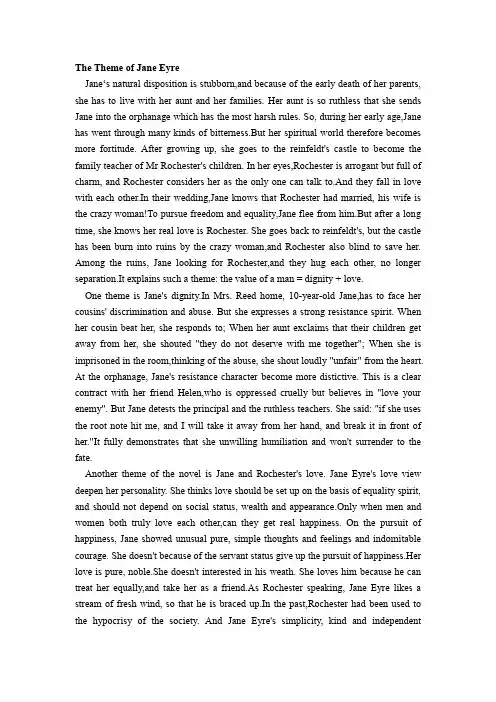
The Theme of Jane EyreJane‘s natural disposition is stubborn,and because of the early death of her parents, she has to live with her aunt and her families. Her aunt is so ruthless that she sends Jane into the orphanage which has the most harsh rules. So, during her early age,Jane has went through many kinds of bitterness.But her spiritual world therefore becomes more fortitude. After growing up, she goes to the reinfeldt's castle to become the family teacher of Mr Rochester's children. In her eyes,Rochester is arrogant but full of charm, and Rochester considers her as the only one can talk to.And they fall in love with each other.In their wedding,Jane knows that Rochester had married, his wife is the crazy woman!To pursue freedom and equality,Jane flee from him.But after a long time, she knows her real love is Rochester. She goes back to reinfeldt's, but the castle has been burn into ruins by the crazy woman,and Rochester also blind to save her. Among the ruins, Jane looking for Rochester,and they hug each other, no longer separation.It explains such a theme: the value of a man = dignity + love.One theme is Jane's dignity.In Mrs. Reed home, 10-year-old Jane,has to face her cousins' discrimination and abuse. But she expresses a strong resistance spirit. When her cousin beat her, she responds to; When her aunt exclaims that their children get away from her, she shouted "they do not deserve with me together"; When she is imprisoned in the room,thinking of the abuse, she shout loudly "unfair" from the heart. At the orphanage, Jane's resistance character become more distictive. This is a clear contract with her friend Helen,who is oppressed cruelly but believes in "love your enemy". But Jane detests the principal and the ruthless teachers. She said: "if she uses the root note hit me, and I will take it away from her hand, and break it in front of her."It fully demonstrates that she unwilling humiliation and won't surrender to the fate.Another theme of the novel is Jane and Rochester's love. Jane Eyre's love view deepen her personality. She thinks love should be set up on the basis of equality spirit, and should not depend on social status, wealth and appearance.Only when men and women both truly love each other,can they get real happiness. On the pursuit of happiness, Jane showed unusual pure, simple thoughts and feelings and indomitable courage. She doesn't because of the servant status give up the pursuit of happiness.Her love is pure, noble.She doesn't interested in his weath. She loves him because he can treat her equally,and take her as a friend.As Rochester speaking, Jane Eyre likes a stream of fresh wind, so that he is braced up.In the past,Rochester had been used to the hypocrisy of the society. And Jane Eyre's simplicity, kind and independentpersonality recall his pursuit and yearning for the life.Jane sympathize for the unfortunate fate of Rochester, thinking his mistake is caused by the objective environment. Despite his ugly, and later he becomes a bankruptcy disabled,what she sees is his inner beauty and sympathize with his unfortunate fate.So, eventually marry him.In the novel,there are two basic melody of Jane's pursuit of life: passion, fantasy, resistance and perseverance;desire for the happiness and freedom of life and the higher realm of spirit pursuit. The theme of the novel is expressed through the rough life experiences of the orphan girl, success in making an heroin who is courageous and tough.Analysis of Major CharactersJane EyreThe development of Jane Eyre’s character is central to the novel. From the beginning, Jane possesses a sense of her self-worth and dignity, a commitment to justice and principle, a trust in God, and a passionate disposition. Her integrity is continually tested over the course of the novel, and Jane must learn to balance the frequently conflicting aspects of herself so as to find contentment.An orphan since early childhood, Jane feels exiled and ostracized at the beginning of the novel, and the cruel treatment she receives from her Aunt Reed and her cousins only exacerbates her feeling of alienation. Afraid that she will never find a true sense of home or community, Jane feels the need to belong somewhere, to find “kin,” or at least “kindred spirits.” This desire tempers her equally intense need for autonomy an d freedom.In her search for freedom, Jane also struggles with the question of what type of freedom she wants. While Rochester initially offers Jane a chance to liberate her passions, Jane comes to realize that such freedom could also mean enslavement—by l iving as Rochester’s mistress, she would be sacrificing her dignity and integrity for the sake of her feelings. St. John Rivers offers Jane another kind of freedom: the freedom to act unreservedly on her principles. He opens to Jane the possibility of exercising her talents fully by working and living with him in India. Jane eventually realizes, though, that this freedom would also constitute a form of imprisonment, because she would be forced to keep her true feelings and her true passions always in check.Charlotte Brontë may have created the character of Jane Eyre as a means of coming to terms with elements of her own life. Much evidence suggests that Brontë, too, struggled to find a balance between love and freedom and to find others who understood her. At many points in the book, Jane voices the author’s then-radical opinions on religion, social class, and gender.Edward RochesterDespite his stern manner and not particularly handsome appearance, Edward Rochester wins Jane’s heart, because she feels the y are kindred spirits, and because he is the first person in the novel to offer Jane lasting love and a real home. Although Rochester is Jane’s social and economic superior, and although men were widely considered to be naturally superior to women in the Victorian period, Jane is Rochester’s intellectual equal. Moreover, after their marriage is interrupted by the disclosure that Rochester is already married to Bertha Mason, Jane is proven to be Rochester’s moral superior.Rochester regrets his former libertinism and lustfulness; nevertheless, he has proven himself to be weaker in many ways than Jane. Jane feels that living with Rochester as his mistress would mean the loss of her dignity. Ultimately, she would become degraded and dependent upon Rochester for love, while unprotected by any true marriage bond. Jane will only enter into marriage with Rochester after she has gained a fortune and a family, and after she has been on the verge of abandoning passion altogether. She waits until she is not unduly influenced by her own poverty, loneliness, psychological vulnerability, or passion. Additionally, because Rochester has been blinded by the fire and has lost his manor house at the end of the novel, he has become weaker while Jane has grown in strength—Jane claims that they are equals, but the marriage dynamic has actually tipped in her favor.Helen BurnsHelen Burns, Jane’s friend at Lowood School, serves as a foil to Mr. Brocklehurst as well as to Jane. While Mr. Brocklehurst embodies an evangelical form of religion that seeks to strip others of their excessive pride or of their ability to take pleasure in worldly things, Helen represents a mode of Christianity that stresses tolerance and acceptance. Brocklehurst uses religion to gain power and to control others; Helen ascetically trusts her own faith and turns the other cheek to Lowood’s harsh policies.Although Helen manifests a certain strength and intellectual maturity, her efforts involve self-negation rather than self-assertion, and Helen’s submissive and asceticnature highlights Jane’s more headstrong character. Like Jane, Helen is an orphan who longs for a home, but Helen believes that she will find this home in Heaven rather than Northern England. And while Helen is not oblivious to the injustices the girls suffer at Lowood, she believes that justice will be found in God’s ultimate judgment—God will reward the good and punish the evil. Jane, on the other hand, is unable to have such blind faith. Her quest is for love and happiness in this world. Nevertheless, she counts on God for support and guidance in her searchSt. John RiversSt. John Rivers is a foil to Edward Rochester. Whereas Rochester is passionate, St. John is austere and ambitious. Jane often describes Rochester’s eyes as flashing and flaming, whereas she constantly associates St. John with rock, ice, and snow. Marriage with Rochester represents the abandonment of principle for the consummation of passion, but marriage to St. John would mean sacrificing passion for principle. When he invites her to come to India with him as a missionary, St. John offers Jane the chance to make a more meaningful contribution to society than she would as a housewife. At the same time, life with St. John would mean life without true love, in which Jane’s need for spiritual solace would be filled only by retreat into the recesses of her own soul. Independence would be accompanied by loneliness, and joining St. John would require Jane to neglect her own legitimate needs for love and emotional support. Her considerat ion of St. John’s proposal leads Jane to understand that, paradoxically, a large part of one’s personal freedom is found in a relationship of mutual emotional dependence.Character Contrast of Rochester and John in Jane Eyre Jane Eyre is a famous novel written by Charlotte Bronte. Jane is the heroine of the book, and she finally married Edward Rochester and they lived a happy life together. There is a person who may be easily neglected——St. John Rivers. He was Jane’s cousin, and also proposed to Jane. But Jane chose Rochester after struggling. There are remarkable differences between Rochester and St. John.Even the adjectives used by Charlotte Bronte for the two male characters are opposite: Rochester is fire and St John is ice.Jane is affected by both men. Bronte wrote, “I was almost as hard beset by him (St John) now as I had been once before, in a different way, by another(Rochester). I was a fool both times. To have yielded then would have been an error of principle; to have yielded now would have be en an error of judgment.”Jane was affected by Rochester because she loved him so much, because he saw what she was and appreciated and encouraged her. She was affected by Rivers because she owed him her life, because he was one of her few relatives, because she was too depressed to resist his efforts and finally because he possessed a character that didn’t explode with anger to help her channel her own against him. When Rochester offered Jane a love without marriage, and John offered her a marriage without love, she gave up all them. Eventually she got the love with marriage, and she chose Rochester as her better half.Edward Rochester, as Jane’s employer and the master of Thornfield, was a wealthy, passionate man with a dark secret that provides much of the novel’s suspense. At first, he seemed indifferent to his employees, including Jane. He was a strange man according to the account of Mrs. Fairfax, “His character is unimpeachable. He is rather peculiar. He is considered a just and liberal landlord by his tenants, but he has never lived much amongst them.”( VolumeⅠ, Chapter Ⅺ, 166) So Jane was curious about him, and cautious when talking with him.Despite Rochester’s stern manner and not particularly handsome appearance, Edward Rochester wined Jane’s heart, because she felt they were kindred spirits and because he was the first person in the novel to offer Jane lasting and a real home. Bronte wanted readers to know that Jane was not attracted by Edward’s appearance but because she recognized something good in his soul.Rochester seemed to be a Gothic hero. He was haunted by his shameful past. He was rash and impetuous when he was young. His problems of Bertha Mason and Celine Varens were partly the result of his recklessness. On the other hand, he was a sympathetic figure. First, he didn’t abandon Adele Varens though he didn’t believe she was his daughter. Second, he stuck to taking care of Bertha though he had suffered so long. What was worse, he was blind and lost one arm for saving his servants when Bertha set big fire. So we can draw a conclusion, actually Rochester was a great man.“While Rochester is a prototype of the fiery, passionate, unconventional man,St. John is his opposite: cold, hard-hearted and repressed.”(Harvard Blue Sky Most popular Study Guides)St. John River was a handsome young clergyman who was the brother of Diana and Mary Rivers. When Jane arrived at Moor House, hungry and penniless, fleeing from Thornfield Hall, John offered her shelter. Although Jane became close friends with the Rivers sisters, she found that St. John had a “reserved, an abstract, and even a brooding nature.”“Now, I did not like this, reader, St. John was a man; but I began to feel he had spoken truth of himself, when he said he was hard and cold. The humanities and amenities of life had no attraction for him...As I looked at his lofty forehead, still and pale as a white stone…I comprehended all at once that he would hardly make a good husband.”( VolumeⅢ, Chapter Ⅷ) From Jane’s words, we can see John was not a ideal husband.He was a pious Christian and humble to work for God. It is easily noticed from his words, “I cannot accept on his behalf a divided allegiance. It must be entire.”(Page 411), and “I, for instance, am but dust and ashes.” (Page 411) .But from the long conversation between and John and Jane, when he asking Jane to marry him and be the wife of a missionary, his aggressive and controlling in his interactions with others exposed. He was entirely alienated from his feelings and devoted solely to an austere ambition. He said, “But, as it is, either our union must be consecrated and sealed by marriage, or it can not exist.” When Jane regarded him as a brother, he answered, “We cannot——we cannot”with short, sharp determination.When I saw thus words during reading the book, I doubted whether John loved Jane or not. He never said “I love you” to Jane, nor did he remember to shake hands with her when living. He just wanted a wife he can “influence efficiently” and “retain absolutely”, rather someone he beloved.So there are sharp distinguishes between Rochester and St. John. Jane described Rochester’s eyes as flashing and flaming, whereas she constantly associated St. John with rock, ice and snow. St. John was self-centered whileRochester not. To match Jane, Rochester tried to change himself. He tried to understood Jane and expressed his feelings truly, sincerely and faithfully. But John didn’t try to change himself. He selected Jane as his wife after noticed Jane’s abilities and good qualities, but he himself did nothing.John vented his passions while John repressed it. Although he “flushed” and “kindled”at the sight of Rosamond Oliver, he would rather turn himself into “an automation” than succumb to Rosamond’s beauty or fortune. What’ s more, Rochester gave Jane freedom while John threatened Jane like a “shackle” through his assertion of his “masterhood”. Optimistic critics point to Jane’s description of St. John as her reminder that the marriage she rejected would offer her much more stifling.By entering into marriage, Jane did enter into a sort of “bond” and get in many ways. This “bond” was the “escape” that she had sought all long. If Jane accepted John’s request, how different her life would be.。
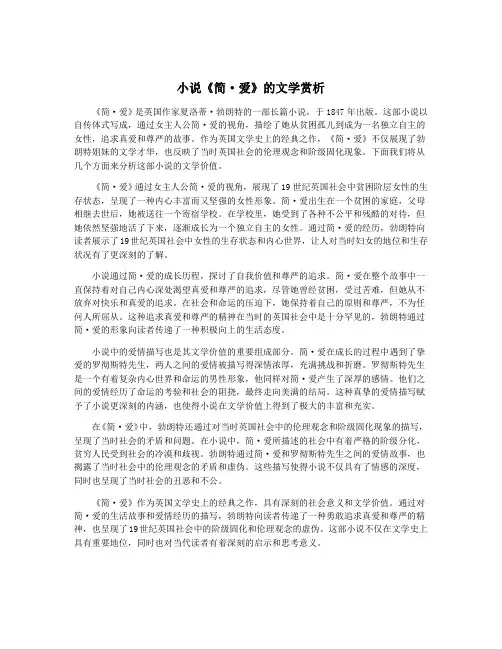
小说《简·爱》的文学赏析《简·爱》是英国作家夏洛蒂·勃朗特的一部长篇小说,于1847年出版。
这部小说以自传体式写成,通过女主人公简·爱的视角,描绘了她从贫困孤儿到成为一名独立自主的女性,追求真爱和尊严的故事。
作为英国文学史上的经典之作,《简·爱》不仅展现了勃朗特姐妹的文学才华,也反映了当时英国社会的伦理观念和阶级固化现象。
下面我们将从几个方面来分析这部小说的文学价值。
《简·爱》通过女主人公简·爱的视角,展现了19世纪英国社会中贫困阶层女性的生存状态,呈现了一种内心丰富而又坚强的女性形象。
简·爱出生在一个贫困的家庭,父母相继去世后,她被送往一个寄宿学校。
在学校里,她受到了各种不公平和残酷的对待,但她依然坚强地活了下来,逐渐成长为一个独立自主的女性。
通过简·爱的经历,勃朗特向读者展示了19世纪英国社会中女性的生存状态和内心世界,让人对当时妇女的地位和生存状况有了更深刻的了解。
小说通过简·爱的成长历程,探讨了自我价值和尊严的追求。
简·爱在整个故事中一直保持着对自己内心深处渴望真爱和尊严的追求,尽管她曾经贫困,受过苦难,但她从不放弃对快乐和真爱的追求。
在社会和命运的压迫下,她保持着自己的原则和尊严,不为任何人所屈从。
这种追求真爱和尊严的精神在当时的英国社会中是十分罕见的,勃朗特通过简·爱的形象向读者传递了一种积极向上的生活态度。
小说中的爱情描写也是其文学价值的重要组成部分。
简·爱在成长的过程中遇到了挚爱的罗彻斯特先生,两人之间的爱情被描写得深情浓厚,充满挑战和折磨。
罗彻斯特先生是一个有着复杂内心世界和命运的男性形象,他同样对简·爱产生了深厚的感情。
他们之间的爱情经历了命运的考验和社会的阻挠,最终走向美满的结局。
这种真挚的爱情描写赋予了小说更深刻的内涵,也使得小说在文学价值上得到了极大的丰富和充实。
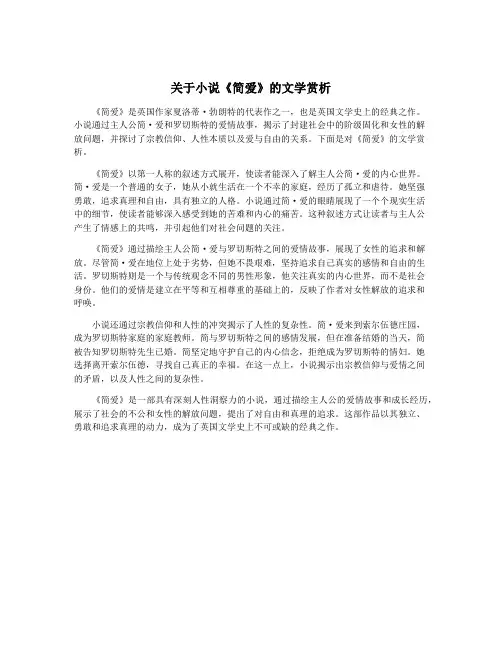
关于小说《简爱》的文学赏析《简爱》是英国作家夏洛蒂·勃朗特的代表作之一,也是英国文学史上的经典之作。
小说通过主人公简·爱和罗切斯特的爱情故事,揭示了封建社会中的阶级固化和女性的解放问题,并探讨了宗教信仰、人性本质以及爱与自由的关系。
下面是对《简爱》的文学赏析。
《简爱》以第一人称的叙述方式展开,使读者能深入了解主人公简·爱的内心世界。
简·爱是一个普通的女子,她从小就生活在一个不幸的家庭,经历了孤立和虐待。
她坚强勇敢,追求真理和自由,具有独立的人格。
小说通过简·爱的眼睛展现了一个个现实生活中的细节,使读者能够深入感受到她的苦难和内心的痛苦。
这种叙述方式让读者与主人公产生了情感上的共鸣,并引起他们对社会问题的关注。
《简爱》通过描绘主人公简·爱与罗切斯特之间的爱情故事,展现了女性的追求和解放。
尽管简·爱在地位上处于劣势,但她不畏艰难,坚持追求自己真实的感情和自由的生活。
罗切斯特则是一个与传统观念不同的男性形象,他关注真实的内心世界,而不是社会身份。
他们的爱情是建立在平等和互相尊重的基础上的,反映了作者对女性解放的追求和呼唤。
小说还通过宗教信仰和人性的冲突揭示了人性的复杂性。
简·爱来到索尔伍德庄园,成为罗切斯特家庭的家庭教师。
简与罗切斯特之间的感情发展,但在准备结婚的当天,简被告知罗切斯特先生已婚。
简坚定地守护自己的内心信念,拒绝成为罗切斯特的情妇。
她选择离开索尔伍德,寻找自己真正的幸福。
在这一点上,小说揭示出宗教信仰与爱情之间的矛盾,以及人性之间的复杂性。
《简爱》是一部具有深刻人性洞察力的小说,通过描绘主人公的爱情故事和成长经历,展示了社会的不公和女性的解放问题,提出了对自由和真理的追求。
这部作品以其独立、勇敢和追求真理的动力,成为了英国文学史上不可或缺的经典之作。

关于小说《简爱》的文学赏析《简爱》是英国女作家夏洛蒂·勃朗特的代表作之一,也是世界文学史上的经典之作。
这部小说以女主角简·爱为叙述者,描写了她从孤儿院到勒沃治庄园的成长历程,塑造了一位坚强独立、追求自由和平等的女性形象。
下面将从人物塑造、情节设置、主题表达等方面对《简爱》进行文学赏析。
人物塑造是《简爱》的重要因素之一。
小说中的主要人物简·爱具有鲜明的个性特点。
她聪明、独立,勇敢地追求自由和平等的权利。
她拒绝被他人压迫,坚持追求自己的幸福。
小说中的罗切斯特先生也是一位复杂、矛盾的人物。
他本性善良,但因为一次意外事故而变得残疾,导致他对爱情有着复杂的心理。
通过这两位主要人物的刻画,勃朗特成功地展现了人性的多样性和复杂性。
情节设置也是《简爱》的亮点之一。
小说通过简的回忆和叙述,将读者带入一个扣人心弦的故事世界。
简·爱经历了孤儿院的艰苦生活,进入勒沃治庄园成为罗切斯特先生的家庭教师,最后与罗切斯特先生坠入爱河。
情节紧凑、扣人心弦,吸引着读者的注意力。
小说中还涉及了父爱、亲情、社会地位等多个主题,给读者带来了思考和共鸣。
《简爱》还通过有力的语言、描写和象征来表达其主题。
小说中的语言简练、明快,具有强烈的感染力。
勃朗特通过细腻的描写,使读者能够真切地感受到主人公的内心世界和情感世界。
小说中还有许多象征性的意象,比如红色火光象征着简内心的独立和坚强,冰雹象征着简所受的不公平待遇等等。
这些经典的语言和象征使得小说具有深刻的内涵和艺术魅力。
《简爱》是一部兼具文学价值和社会意义的经典之作。
勃朗特通过描写简·爱的成长历程,向读者呈现了一个自强不息、追求自由与平等的女性形象。
小说中的人物形象塑造、情节设置和主题表达都体现了勃朗特作品的独特风格和魅力。
它不仅是世界文学史上的经典之作,也成为了人们关于爱、社会问题和人性的经典阐述。
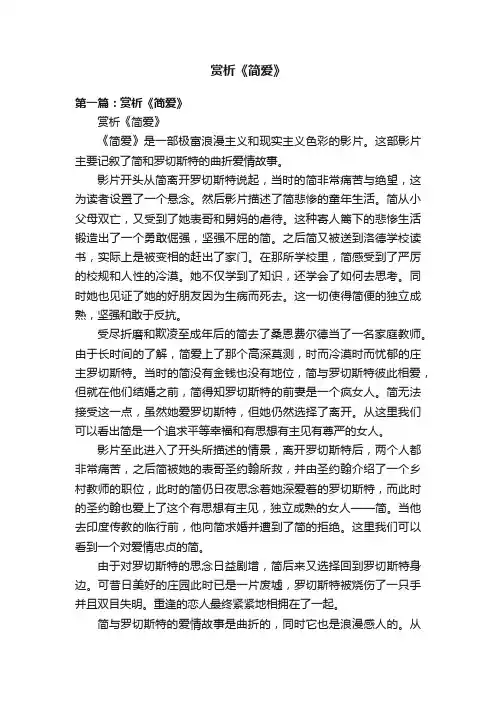
赏析《简爱》第一篇:赏析《简爱》赏析《简爱》《简爱》是一部极富浪漫主义和现实主义色彩的影片。
这部影片主要记叙了简和罗切斯特的曲折爱情故事。
影片开头从简离开罗切斯特说起,当时的简非常痛苦与绝望,这为读者设置了一个悬念。
然后影片描述了简悲惨的童年生活。
简从小父母双亡,又受到了她表哥和舅妈的虐待。
这种寄人篱下的悲惨生活锻造出了一个勇敢倔强,坚强不屈的简。
之后简又被送到洛德学校读书,实际上是被变相的赶出了家门。
在那所学校里,简感受到了严厉的校规和人性的冷漠。
她不仅学到了知识,还学会了如何去思考。
同时她也见证了她的好朋友因为生病而死去。
这一切使得简便的独立成熟,坚强和敢于反抗。
受尽折磨和欺凌至成年后的简去了桑恩费尔德当了一名家庭教师。
由于长时间的了解,简爱上了那个高深莫测,时而冷漠时而忧郁的庄主罗切斯特。
当时的简没有金钱也没有地位,简与罗切斯特彼此相爱,但就在他们结婚之前,简得知罗切斯特的前妻是一个疯女人。
简无法接受这一点,虽然她爱罗切斯特,但她仍然选择了离开。
从这里我们可以看出简是一个追求平等幸福和有思想有主见有尊严的女人。
影片至此进入了开头所描述的情景,离开罗切斯特后,两个人都非常痛苦,之后简被她的表哥圣约翰所救,并由圣约翰介绍了一个乡村教师的职位,此时的简仍日夜思念着她深爱着的罗切斯特,而此时的圣约翰也爱上了这个有思想有主见,独立成熟的女人——简。
当他去印度传教的临行前,他向简求婚并遭到了简的拒绝。
这里我们可以看到一个对爱情忠贞的简。
由于对罗切斯特的思念日益剧增,简后来又选择回到罗切斯特身边。
可昔日美好的庄园此时已是一片废墟,罗切斯特被烧伤了一只手并且双目失明。
重逢的恋人最终紧紧地相拥在了一起。
简与罗切斯特的爱情故事是曲折的,同时它也是浪漫感人的。
从这部影片中,我们看到了一个敢于反抗、敢于争取自由与平等幸福的简,她对生活的信心与坚强不屈,对爱人的忠贞让我们深深地感动与折服。
从中我们可以领悟到:我们应该努力追寻自己想要的幸福生活,不管现实如何残酷,只要努力争取,幸福一定会如期而至。
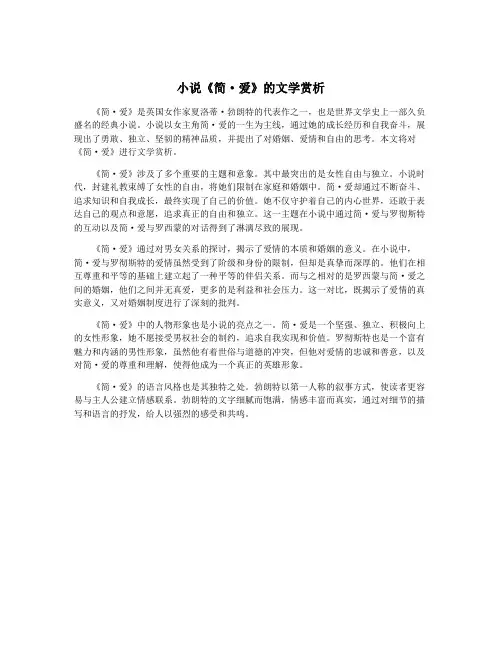
小说《简·爱》的文学赏析《简·爱》是英国女作家夏洛蒂·勃朗特的代表作之一,也是世界文学史上一部久负盛名的经典小说。
小说以女主角简·爱的一生为主线,通过她的成长经历和自我奋斗,展现出了勇敢、独立、坚韧的精神品质,并提出了对婚姻、爱情和自由的思考。
本文将对《简·爱》进行文学赏析。
《简·爱》涉及了多个重要的主题和意象。
其中最突出的是女性自由与独立。
小说时代,封建礼教束缚了女性的自由,将她们限制在家庭和婚姻中。
简·爱却通过不断奋斗、追求知识和自我成长,最终实现了自己的价值。
她不仅守护着自己的内心世界,还敢于表达自己的观点和意愿,追求真正的自由和独立。
这一主题在小说中通过简·爱与罗彻斯特的互动以及简·爱与罗西蒙的对话得到了淋漓尽致的展现。
《简·爱》通过对男女关系的探讨,揭示了爱情的本质和婚姻的意义。
在小说中,简·爱与罗彻斯特的爱情虽然受到了阶级和身份的限制,但却是真挚而深厚的。
他们在相互尊重和平等的基础上建立起了一种平等的伴侣关系。
而与之相对的是罗西蒙与简·爱之间的婚姻,他们之间并无真爱,更多的是利益和社会压力。
这一对比,既揭示了爱情的真实意义,又对婚姻制度进行了深刻的批判。
《简·爱》中的人物形象也是小说的亮点之一。
简·爱是一个坚强、独立、积极向上的女性形象,她不愿接受男权社会的制约,追求自我实现和价值。
罗彻斯特也是一个富有魅力和内涵的男性形象,虽然他有着世俗与道德的冲突,但他对爱情的忠诚和善意,以及对简·爱的尊重和理解,使得他成为一个真正的英雄形象。
《简·爱》的语言风格也是其独特之处。
勃朗特以第一人称的叙事方式,使读者更容易与主人公建立情感联系。
勃朗特的文字细腻而饱满,情感丰富而真实,通过对细节的描写和语言的抒发,给人以强烈的感受和共鸣。

《简爱》赏析
《简爱》是英国小说家夏洛蒂·勃朗特的代表作之一,讲述了一个孤儿简爱的成长经历和爱情故事。
以下是对《简爱》的赏析:
1. 关于女性的自我意识
《简爱》是一部关于女性自我意识觉醒的小说。
作者通过简爱的人物描写,展现了女性应有的自尊、勇气、坚定和追求平等的精神。
简爱在面对生活的种种不公和自身的苦难时,不屈服于命运的安排,而是依靠自己的勇气和智慧,赢得了自由与幸福。
2. 爱情与自由
《简爱》不仅是一部成长小说,更是一部爱情小说。
简爱与罗切斯特之间的爱情是在对彼此的心灵深处建立的,他们有着同样的特点,如渴望自由和坚定的信仰。
他们在经历了重重困难和考验之后,最终赢得了真正的幸福。
简爱认为,真爱应该是互相理解的,不受金钱财物、地位和外在条件的干扰。
3. 对封建道德的挑战
小说展现了封建道德的可悲和狭隘。
勃朗特通过罗切斯特的经历,批判了上层社会那些陋习、虚伪和虚荣心,对封建道德提出了强烈的挑战。
小说也体现了女性及下层社会的困难,而她们正是社会指责和轻视的对象。
勃朗特在小说中让女性得到了
进步和自立,因为女性应该有机会走出舒适区,了解自我,并改善自己的生活。
4. 关于信仰
勃朗特在小说中探讨了信仰这个主题。
对简爱来说,信仰是她生活中至关重要的一部分,它是她坚强、勇敢、智慧和正义的精神支柱。
信仰也帮助她拥有了对人生的理解和思考,赋予了她一种独特的生命意义。
总之,《简爱》是一部描写女性自我意识觉醒和爱情成长的经典小说,它的价值在于它揭示了人性、社会和道德的深层问题,仍旧是引人入胜的读物。
关于小说《简爱》的文学赏析《简爱》是英国作家夏洛蒂·勃朗特的代表作之一,也是世界文学史上的经典之作。
本文将从小说的背景、主题、人物形象、情节、语言等方面进行文学赏析。
谈谈小说的背景。
《简爱》的故事发生在19世纪英国,这是一个充满了社会阶级固化、女性受限、道德束缚的时代。
通过描写主人公简·爱的成长经历与她与罗切斯特先生之间的爱情纠葛,勃朗特深刻地揭示了当时社会的不公、压抑和人性的纯真与复杂。
谈谈小说中的人物形象。
简·爱是一个非常鲜明的人物形象。
她聪明、坚韧、独立,敢于挑战传统的道德观念,她是一个奋斗、勇敢的女性形象。
罗切斯特先生则是一个复杂的男性形象,他深受家族悲剧的阴影所困扰,但在与简的相处中逐渐得到救赎。
其他人物形象也都非常丰满,如简的亲戚约翰、罗切斯特先生的儿子阿黛尔等,都展现出独特的个性和故事。
谈谈小说的情节。
《简爱》的情节丰富多样,紧凑而有张力。
小说以简·爱的童年生活为开端,描写了她在寄宿学校的成长经历,随后成为罗切斯特先生府上的家庭教师,两人之间逐渐产生了爱情。
他们的幸福被揭开的秘密和社会阶级差距所阻碍。
经历了一系列曲折,他们终于得到了幸福的结局。
谈谈小说的语言。
勃朗特以深入细致的描写和情感丰富的语言,给读者展示了一个精致细腻、富有情感的世界。
她善于通过简爱笔下的世界,揭示出女性的独特魅力和思想,使读者更加深入地了解了那个时代的社会生活和人性的复杂。
小说《简爱》是一部经典的文学作品,通过对19世纪英国社会的描绘和主人公简·爱的成长经历,勃朗特成功地刻画出了一个追求自由与平等的女性形象。
小说深入细致的描写和情感丰富的语言,使读者能够感受到作者对人性和社会问题的深刻洞察力。
这是一部值得一读的经典之作。
小说《简·爱》的文学赏析《简·爱》是英国作家夏洛蒂·勃朗特于1847年出版的一部文学经典,也是世界文学史上最杰出的爱情小说之一。
小说以第一人称的叙述方式展现了女主角简·爱的一生,描述了她从孤儿院到家庭教师再到独立自主的生活,经历了痛苦和挣扎,最终在爱情中找到了幸福和自我价值。
小说中不仅有深刻的心理描写,还涵盖了社会问题和女性解放等多方面的主题,被誉为英国文学的经典之作。
《简·爱》在文学形式上具有较高的艺术价值。
小说的语言简洁明了、流畅优美,表达了丰富的感情和思想。
作者运用了大量的比喻、隐喻和象征,使小说更加生动有趣。
小说中的罗切斯特庄园和荒凉的寂静岛,分别代表了主人公的两种不同的生活状态。
小说中还有很多完整而丰富的场景描写,比如孤儿院的景色、庄园的建筑和自然风景等,都给读者留下深刻的印象。
《简·爱》在人物塑造上也达到了高度的艺术成就。
主人公简·爱是一个勇敢、坚强、聪明和善良的女性形象,她有着独立的思想和追求自由和平等的精神,是一位对抗命运的英雄。
而罗切斯特则是一个充满矛盾和内心挣扎的复杂形象,他在与简·爱的爱情中经历了一次心灵的洗礼,变得更加成熟和宽容。
小说中还有许多其他丰满的次要人物,比如矫正女管家和静修女修道院院长等,他们都是个性鲜明、富有戏剧性的形象,为整个故事增添了不少魅力。
《简·爱》在内容上也蕴含着深刻的思想和感情。
小说以第一人称叙述,真实地展现了主人公的内心世界和成长历程,让读者更容易与主人公产生情感上的共鸣。
作者通过主人公的经历和情感,探讨了爱情、婚姻、自由、平等、宗教以及女性地位等多种社会问题,对当时的英国社会进行了深刻的剖析和批判。
小说中充满了对传统观念和权威的挑战,展现了一种新的生活态度和价值观,引发了读者对现实社会的思考和反思。
《简·爱》在艺术风格上也具有独特的魅力。
小说的情节设计巧妙,节奏紧凑,情节跌宕起伏,让人读来充满了悬念和吸引力。
小说《简·爱》的文学赏析《简·爱》是英国作家夏洛蒂·勃朗特创作的一部长篇小说,被认为是维多利亚时代最重要的文学作品之一。
小说以主人公简·爱的成长经历为线索,揭示了封建社会下女性的困境和自我解放的意义。
小说通过描写主人公简·爱的成长,展示了女性在封建社会的困境。
简·爱在出生后不久就失去了双亲,被送到了寄养学校。
在学校中,她遭到了虐待和歧视,成为孤独的受害者。
而在工作后,她成为一个家庭教师,虽然她对儿童教育充满热情和耐心,但她依然受到家庭成员的瞧不起和欺负。
通过这些描写,勃朗特展示了封建社会对女性的压迫和歧视,以及她们在生活中的孤立和困难。
小说通过主人公简·爱的自我解放,表达了女性追求自由和独立的渴望。
简·爱不仅通过自学和阅读丰富自己的知识和修养,还通过努力工作和不断追求,逐渐赢得了自己的尊重和重视。
她对待自己的爱情和婚姻同样坚持自我,不愿意放弃自己的尊严和独立。
勃朗特通过简·爱的经历,表达了女性渴望自我解放和追求独立的心声,以及追求自由和尊严的力量。
小说通过简·爱的爱情故事,揭示了真爱的力量和女性的智慧。
简·爱与罗彻斯特先生相遇后,他们逐渐建立了一种平等和尊重的感情关系,并最终走到了一起。
简·爱的爱情故事不仅展示了真爱的力量,也表明了女性的智慧和勇气。
通过简·爱的努力和奋斗,她最终实现了自我解放和幸福。
《简·爱》是一部揭示女性困境和追求自由的重要文学作品。
通过主人公简·爱的成长和自我解放,勃朗特展示了封建社会对女性的压迫和歧视,以及她们追求自由和独立的渴望。
通过爱情故事,勃朗特表达了真爱的力量和女性的智慧。
这部小说不仅具有现实意义,也表达了勇气和希望。
简爱电影细节赏析《简爱》是一部由夏洛特·勃朗特的同名小说改编的电影,讲述了一个女孩简爱在19世纪英国的成长故事。
这部电影深刻地描绘了简爱在一个充满不公和压迫的社会中,如何坚强地追求自由和尊严的故事。
下面我们将对这部电影进行细节赏析。
首先,电影中的主人公简爱是一个非常坚强的女孩。
她从小就经历了很多的苦难和磨难,但是她并没有被这些困难击倒。
相反,她在面对困难时展现出了非常坚强的意志和勇气。
她不愿意被社会的规则和传统所束缚,而是追求自己的梦想和自由。
这种坚强和勇敢的品质使得简爱成为了一个非常令人敬佩的角色。
其次,电影中的爱情线也是非常精彩。
简爱在成长过程中遇到了很多的男性角色,但是她并没有被他们所吸引。
直到她遇到了罗切斯特先生,她才真正地感受到了爱情的力量。
罗切斯特先生是一个非常有魅力和魄力的男人,他对简爱展现出了真挚的爱意。
简爱也深深地爱上了他,但是她并没有因此而放弃自己的追求和尊严。
她坚持着自己的原则,最终得到了自己的幸福。
另外,电影中的反传统和女性解放主题也是非常突出的。
简爱所处的时代是一个非常保守和传统的社会,女性被束缚在家庭和社会的角色中,缺乏自由和尊严。
但是简爱并不甘于被动地接受这种命运,她追求着自己的独立和尊严。
她不愿意成为一个被动的妻子和母亲,而是追求着自己的梦想和自由。
这种反传统和女性解放的主题使得电影更加具有现代意义和启发性。
最后,电影中的情节设置和视觉效果也是非常出色的。
导演通过精心的情节设置和细腻的表演,将简爱的成长故事展现得非常感人和震撼人心。
同时,电影的视觉效果也是非常出色的,通过精美的布景和服装设计,将19世纪英国的社会风貌展现得淋漓尽致。
观众仿佛置身于那个时代,感受着简爱的坚强和勇敢。
总的来说,电影《简爱》是一部非常精彩和感人的电影,通过对简爱的成长故事的细腻描绘和深刻探讨,展现了一个女孩在一个充满不公和压迫的社会中,如何坚强地追求自由和尊严的故事。
这部电影不仅具有很高的艺术价值,而且具有很强的现实意义和启发意义。
关于《简爱》的文学鉴赏
《简爱》是一部大名鼎鼎的英国小说,作者是著名女性小说家詹姆斯·奥威尔。
该作品以上世纪中叶的英国封建社会为背景,围绕两个主要人物简爱和忏悔者讲述一个充满情感色彩及悲剧、爱情及空情的罗曼史。
该作品上手行文比较流畅,章节结构清晰,环环相扣,可读性很强。
该作品细
腻的描述了简爱的内心活动,对她及有关人物的心理变化也处理得很精妙,令人感动。
此外,文章的语言也非常精美、优美、生动、抒情,读起来十分舒服,深受读者的欢迎。
此外,作者在书中把一切都与社会现实息息相关,穿插彩蛋令人赞叹,令人深
深受到感动,主题思想突出,文章里更把女性主义、人文主义以及对人生真理的探寻无疑地溶穿在作者叙述中。
从当时社会角度上来说,《简爱》是一部有价值又有内涵的文学作品。
作者极
其用心,无私把自己的心思撒入文字之中,既有着强烈的现实意識,又有浓厚的文艺色彩,既较为真实、准确地反映了英国封建社会的现实生活,又用朴实的人文思想,揭示人性的本质,为读者提供一种更深入的哲理思想,带领我们走进一个前所未有的人文世界。
总之,《简爱》是一部具有代表性的史诗大片。
它是一部具有强烈的现实意义
和广泛性的文艺精品,其艺术成就不容忽视。
它以其高雅、感染力和史诗般的大气韵律,在文学史上留下了不可磨灭的印迹,受到通人普遍重视和赞扬。
正所谓:“若说汉代有《红楼梦》,英国有《简爱》,看一看书都能思聪明!”。
小说《简·爱》的文学赏析《简·爱》是英国女作家夏洛蒂·勃朗特创作的一部经典小说,也是她最著名的作品之一。
本文将对《简·爱》进行文学赏析,深入剖析小说的主题、人物塑造以及风格和语言运用等方面。
我们来谈谈《简·爱》的主题。
整部小说以自我成长和追求自由与平等作为核心主题。
小说中的女主人公简·爱,从一个孤苦伶仃的孤儿变成了一个独立自主的女性,她在追求自由和平等的道路上经历了种种挫折和磨难。
故事中,简·爱通过自己的努力和毅力,战胜了一切困难,最终实现了自己的价值和追求。
我们来看看《简·爱》中的人物塑造。
小说中的人物形象丰满真实,塑造细腻入微。
女主人公简·爱是一个勇敢坚强的女性形象,她拥有独立的思想和追求自主的精神,同时又深爱着她的家人和朋友。
罗切斯特男主人公则是一个具有强烈个性和矛盾心理的男人,他既渴望爱情又害怕受伤害。
其他次要人物如简·爱的朋友海伦伯恩斯和梅森以及罗切斯特的前妻贝西也都栩栩如生,每个人物都有自己的性格特点和故事,为整个小说增添了厚重的色彩。
接下来,我们来分析《简·爱》的风格和语言运用。
整个小说在叙事上采用了第一人称的视角,通过简·爱自己的声音来讲述故事,使读者更容易与她产生共鸣。
在描写上,勃朗特运用了生动的比喻、形容和对话等手法,使人物和情节更加生动鲜活。
勃朗特还巧妙地运用了回忆和心理描写的手法,展示了简·爱复杂的内心世界和思想感情的变化。
《简·爱》是一部具有深刻主题和丰富人物形象的经典小说,它以其独特的风格和语言运用成为文学史上的经典之作。
这部小说通过对自我成长和追求自由与平等的讲述,向读者展示了一个普通女性通过自己的努力和勇气实现梦想的故事。
它不仅在文学上具有重要价值,同时也对后世的文学和思想产生了深远影响。
The Theme of Jane EyreJane‘s natural disposition is stubborn,and because of the early death of her parents, she has to live with her aunt and her families. Her aunt is so ruthless that she sends Jane into the orphanage which has the most harsh rules. So, during her early age,Jane has went through many kinds of bitterness.But her spiritual world therefore becomes more fortitude. After growing up, she goes to the reinfeldt's castle to become the family teacher of Mr Rochester's children. In her eyes,Rochester is arrogant but full of charm, and Rochester considers her as the only one can talk to.And they fall in love with each other.In their wedding,Jane knows that Rochester had married, his wife is the crazy woman!To pursue freedom and equality,Jane flee from him.But after a long time, she knows her real love is Rochester. She goes back to reinfeldt's, but the castle has been burn into ruins by the crazy woman,and Rochester also blind to save her. Among the ruins, Jane looking for Rochester,and they hug each other, no longer separation.It explains such a theme: the value of a man = dignity + love.One theme is Jane's dignity.In Mrs. Reed home, 10-year-old Jane,has to face her cousins' discrimination and abuse. But she expresses a strong resistance spirit. When her cousin beat her, she responds to; When her aunt exclaims that their children get away from her, she shouted "they do not deserve with me together"; When she is imprisoned in the room,thinking of the abuse, she shout loudly "unfair" from the heart. At the orphanage, Jane's resistance character become more distictive. This is a clear contract with her friend Helen,who is oppressed cruelly but believes in "love your enemy". But Jane detests the principal and the ruthless teachers. She said: "if she uses the root note hit me, and I will take it away from her hand, and break it in front of her."It fully demonstrates that she unwilling humiliation and won't surrender to the fate.Another theme of the novel is Jane and Rochester's love. Jane Eyre's love view deepen her personality. She thinks love should be set up on the basis of equality spirit, and should not depend on social status, wealth and appearance.Only when men and women both truly love each other,can they get real happiness. On the pursuit of happiness, Jane showed unusual pure, simple thoughts and feelings and indomitable courage. She doesn't because of the servant status give up the pursuit of happiness.Her love is pure, noble.She doesn't interested in his weath. She loves him because he can treat her equally,and take her as a friend.As Rochester speaking, Jane Eyre likes a stream of fresh wind, so that he is braced up.In the past,Rochester had been used to the hypocrisy of the society. And Jane Eyre's simplicity, kind and independentpersonality recall his pursuit and yearning for the life.Jane sympathize for the unfortunate fate of Rochester, thinking his mistake is caused by the objective environment. Despite his ugly, and later he becomes a bankruptcy disabled,what she sees is his inner beauty and sympathize with his unfortunate fate.So, eventually marry him.In the novel,there are two basic melody of Jane's pursuit of life: passion, fantasy, resistance and perseverance;desire for the happiness and freedom of life and the higher realm of spirit pursuit. The theme of the novel is expressed through the rough life experiences of the orphan girl, success in making an heroin who is courageous and tough.Analysis of Major CharactersJane EyreThe development of Jane Eyre’s character is central to the novel. From the beginning, Jane possesses a sense of her self-worth and dignity, a commitment to justice and principle, a trust in God, and a passionate disposition. Her integrity is continually tested over the course of the novel, and Jane must learn to balance the frequently conflicting aspects of herself so as to find contentment.An orphan since early childhood, Jane feels exiled and ostracized at the beginning of the novel, and the cruel treatment she receives from her Aunt Reed and her cousins only exacerbates her feeling of alienation. Afraid that she will never find a true sense of home or community, Jane feels the need to belong somewhere, to find “kin,” or at least “kindred spirits.” This desire tempers her equally intense need for autonomy an d freedom.In her search for freedom, Jane also struggles with the question of what type of freedom she wants. While Rochester initially offers Jane a chance to liberate her passions, Jane comes to realize that such freedom could also mean enslavement—by l iving as Rochester’s mistress, she would be sacrificing her dignity and integrity for the sake of her feelings. St. John Rivers offers Jane another kind of freedom: the freedom to act unreservedly on her principles. He opens to Jane the possibility of exercising her talents fully by working and living with him in India. Jane eventually realizes, though, that this freedom would also constitute a form of imprisonment, because she would be forced to keep her true feelings and her true passions always in check.Charlotte Brontë may have created the character of Jane Eyre as a means of coming to terms with elements of her own life. Much evidence suggests that Brontë, too, struggled to find a balance between love and freedom and to find others who understood her. At many points in the book, Jane voices the author’s then-radical opinions on religion, social class, and gender.Edward RochesterDespite his stern manner and not particularly handsome appearance, Edward Rochester wins Jane’s heart, because she feels the y are kindred spirits, and because he is the first person in the novel to offer Jane lasting love and a real home. Although Rochester is Jane’s social and economic superior, and although men were widely considered to be naturally superior to women in the Victorian period, Jane is Rochester’s intellectual equal. Moreover, after their marriage is interrupted by the disclosure that Rochester is already married to Bertha Mason, Jane is proven to be Rochester’s moral superior.Rochester regrets his former libertinism and lustfulness; nevertheless, he has proven himself to be weaker in many ways than Jane. Jane feels that living with Rochester as his mistress would mean the loss of her dignity. Ultimately, she would become degraded and dependent upon Rochester for love, while unprotected by any true marriage bond. Jane will only enter into marriage with Rochester after she has gained a fortune and a family, and after she has been on the verge of abandoning passion altogether. She waits until she is not unduly influenced by her own poverty, loneliness, psychological vulnerability, or passion. Additionally, because Rochester has been blinded by the fire and has lost his manor house at the end of the novel, he has become weaker while Jane has grown in strength—Jane claims that they are equals, but the marriage dynamic has actually tipped in her favor.Helen BurnsHelen Burns, Jane’s friend at Lowood School, serves as a foil to Mr. Brocklehurst as well as to Jane. While Mr. Brocklehurst embodies an evangelical form of religion that seeks to strip others of their excessive pride or of their ability to take pleasure in worldly things, Helen represents a mode of Christianity that stresses tolerance and acceptance. Brocklehurst uses religion to gain power and to control others; Helen ascetically trusts her own faith and turns the other cheek to Lowood’s harsh policies.Although Helen manifests a certain strength and intellectual maturity, her efforts involve self-negation rather than self-assertion, and Helen’s submissive and asceticnature highlights Jane’s more headstrong character. Like Jane, Helen is an orphan who longs for a home, but Helen believes that she will find this home in Heaven rather than Northern England. And while Helen is not oblivious to the injustices the girls suffer at Lowood, she believes that justice will be found in God’s ultimate judgment—God will reward the good and punish the evil. Jane, on the other hand, is unable to have such blind faith. Her quest is for love and happiness in this world. Nevertheless, she counts on God for support and guidance in her searchSt. John RiversSt. John Rivers is a foil to Edward Rochester. Whereas Rochester is passionate, St. John is austere and ambitious. Jane often describes Rochester’s eyes as flashing and flaming, whereas she constantly associates St. John with rock, ice, and snow. Marriage with Rochester represents the abandonment of principle for the consummation of passion, but marriage to St. John would mean sacrificing passion for principle. When he invites her to come to India with him as a missionary, St. John offers Jane the chance to make a more meaningful contribution to society than she would as a housewife. At the same time, life with St. John would mean life without true love, in which Jane’s need for spiritual solace would be filled only by retreat into the recesses of her own soul. Independence would be accompanied by loneliness, and joining St. John would require Jane to neglect her own legitimate needs for love and emotional support. Her considerat ion of St. John’s proposal leads Jane to understand that, paradoxically, a large part of one’s personal freedom is found in a relationship of mutual emotional dependence.Character Contrast of Rochester and John in Jane Eyre Jane Eyre is a famous novel written by Charlotte Bronte. Jane is the heroine of the book, and she finally married Edward Rochester and they lived a happy life together. There is a person who may be easily neglected——St. John Rivers. He was Jane’s cousin, and also proposed to Jane. But Jane chose Rochester after struggling. There are remarkable differences between Rochester and St. John.Even the adjectives used by Charlotte Bronte for the two male characters are opposite: Rochester is fire and St John is ice.Jane is affected by both men. Bronte wrote, “I was almost as hard beset by him (St John) now as I had been once before, in a different way, by another(Rochester). I was a fool both times. To have yielded then would have been an error of principle; to have yielded now would have be en an error of judgment.”Jane was affected by Rochester because she loved him so much, because he saw what she was and appreciated and encouraged her. She was affected by Rivers because she owed him her life, because he was one of her few relatives, because she was too depressed to resist his efforts and finally because he possessed a character that didn’t explode with anger to help her channel her own against him. When Rochester offered Jane a love without marriage, and John offered her a marriage without love, she gave up all them. Eventually she got the love with marriage, and she chose Rochester as her better half.Edward Rochester, as Jane’s employer and the master of Thornfield, was a wealthy, passionate man with a dark secret that provides much of the novel’s suspense. At first, he seemed indifferent to his employees, including Jane. He was a strange man according to the account of Mrs. Fairfax, “His character is unimpeachable. He is rather peculiar. He is considered a just and liberal landlord by his tenants, but he has never lived much amongst them.”( VolumeⅠ, Chapter Ⅺ, 166) So Jane was curious about him, and cautious when talking with him.Despite Rochester’s stern manner and not particularly handsome appearance, Edward Rochester wined Jane’s heart, because she felt they were kindred spirits and because he was the first person in the novel to offer Jane lasting and a real home. Bronte wanted readers to know that Jane was not attracted by Edward’s appearance but because she recognized something good in his soul.Rochester seemed to be a Gothic hero. He was haunted by his shameful past. He was rash and impetuous when he was young. His problems of Bertha Mason and Celine Varens were partly the result of his recklessness. On the other hand, he was a sympathetic figure. First, he didn’t abandon Adele Varens though he didn’t believe she was his daughter. Second, he stuck to taking care of Bertha though he had suffered so long. What was worse, he was blind and lost one arm for saving his servants when Bertha set big fire. So we can draw a conclusion, actually Rochester was a great man.“While Rochester is a prototype of the fiery, passionate, unconventional man,St. John is his opposite: cold, hard-hearted and repressed.”(Harvard Blue Sky Most popular Study Guides)St. John River was a handsome young clergyman who was the brother of Diana and Mary Rivers. When Jane arrived at Moor House, hungry and penniless, fleeing from Thornfield Hall, John offered her shelter. Although Jane became close friends with the Rivers sisters, she found that St. John had a “reserved, an abstract, and even a brooding nature.”“Now, I did not like this, reader, St. John was a man; but I began to feel he had spoken truth of himself, when he said he was hard and cold. The humanities and amenities of life had no attraction for him...As I looked at his lofty forehead, still and pale as a white stone…I comprehended all at once that he would hardly make a good husband.”( VolumeⅢ, Chapter Ⅷ) From Jane’s words, we can see John was not a ideal husband.He was a pious Christian and humble to work for God. It is easily noticed from his words, “I cannot accept on his behalf a divided allegiance. It must be entire.”(Page 411), and “I, for instance, am but dust and ashes.” (Page 411) .But from the long conversation between and John and Jane, when he asking Jane to marry him and be the wife of a missionary, his aggressive and controlling in his interactions with others exposed. He was entirely alienated from his feelings and devoted solely to an austere ambition. He said, “But, as it is, either our union must be consecrated and sealed by marriage, or it can not exist.” When Jane regarded him as a brother, he answered, “We cannot——we cannot”with short, sharp determination.When I saw thus words during reading the book, I doubted whether John loved Jane or not. He never said “I love you” to Jane, nor did he remember to shake hands with her when living. He just wanted a wife he can “influence efficiently” and “retain absolutely”, rather someone he beloved.So there are sharp distinguishes between Rochester and St. John. Jane described Rochester’s eyes as flashing and flaming, whereas she constantly associated St. John with rock, ice and snow. St. John was self-centered whileRochester not. To match Jane, Rochester tried to change himself. He tried to understood Jane and expressed his feelings truly, sincerely and faithfully. But John didn’t try to change himself. He selected Jane as his wife after noticed Jane’s abilities and good qualities, but he himself did nothing.John vented his passions while John repressed it. Although he “flushed” and “kindled”at the sight of Rosamond Oliver, he would rather turn himself into “an automation” than succumb to Rosamond’s beauty or fortune. What’ s more, Rochester gave Jane freedom while John threatened Jane like a “shackle” through his assertion of his “masterhood”. Optimistic critics point to Jane’s description of St. John as her reminder that the marriage she rejected would offer her much more stifling.By entering into marriage, Jane did enter into a sort of “bond” and get in many ways. This “bond” was the “escape” that she had sought all long. If Jane accepted John’s request, how different her life would be.。